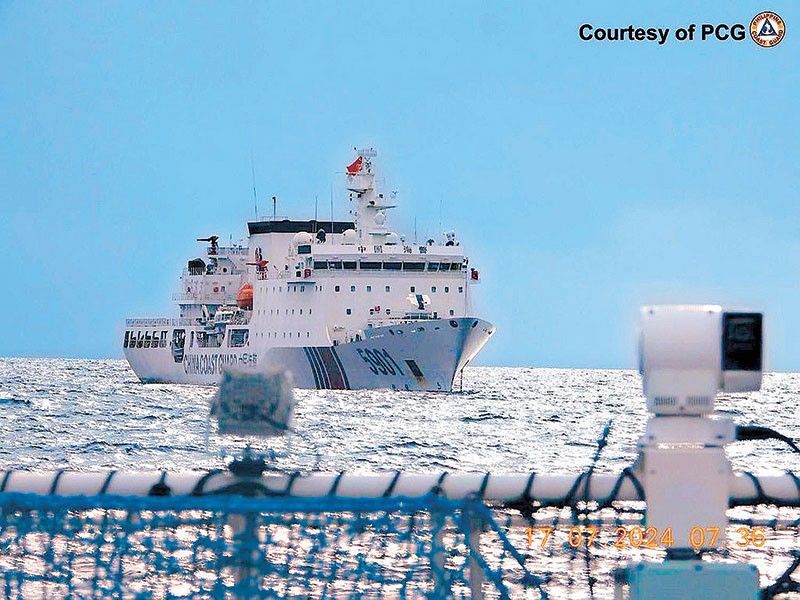Philippines, China set up presidential hotline on South China Sea

MANILA, Philippines — The Philippines and China have signed an agreement raising to the highest level the officials who may use an emergency hotline concerning incidents in the South China Sea, involving presidential offices and foreign ministries.
The Department of Foreign Affairs (DFA) said the “Arrangement on Improving Philippines-China Maritime Communication Mechanisms” – signed during talks held in Manila on July 2 following a violent confrontation at Ayungin Shoal – would provide various “channels for communication” between the two nations, specifically on maritime issues.
The hotline talks could also be done through the DFA and China’s Ministry of Foreign Affairs, including foreign minister and vice foreign ministers or their designated representatives.
Coast Guard channels will be established following a corresponding memorandum of understanding (MOU) between the two sides.
The DFA is in discussions with the Chinese side on the guidelines that will govern the implementation of this arrangement.
In August, the DFA expressed disappointment that it was unable to reach its Chinese counterpart through the maritime communication mechanism for several hours while the China Coast Guard (CCG) ships and Chinese militia vessels blocked and water cannoned two Philippine boats on a routine supply mission to BRP Sierra Madre at Ayungin Shoal.
China did not reciprocate, with the same sense of urgency, the communications initiated by the Philippines as has been demonstrated by the Philippines when receiving communications initiated by the Chinese side.
The Chinese Foreign Ministry said China and the Philippines discussed improving maritime communication mechanism, promoting dialogue between the coast guards of the two countries and advancing cooperation in marine science and technology and environmental protection during the Bilateral Consultation Mechanism on the South China Sea in Manila on July 2.
The two sides had a candid and constructive exchange of views on the situation in the South China Sea, in particular, on handling the situation at Ayungin Shoal. China’s illegal and aggressive actions in the West Philippine Sea has sparked international condemnation.
Foreign Affairs Undersecretary Ma. Theresa Lazaro underscored to Chinese Vice Foreign Minister Chen Xiaodong that the Philippines will be relentless in protecting its interests and upholding its sovereignty, sovereign rights and jurisdiction in the West Philippine Sea.
Maritime zones bill
The Philippine Maritime Zones bill that would delineate the country’s maritime zones is just one signature away from becoming a law after it was approved by the bicameral conference committee of the Senate and the House of Representatives yesterday.
“This will be the first time that the term ‘West Philippine Sea’ will be embodied, mentioned and referred to in a law that will be passed by Congress,” said Senate majority leader Francis Tolentino, the sponsor of the proposed measure.
The new version has included the maritime boundaries in Palawan and the Philippine or Benham Rise, as well as reconciled the “technical” provisions on internal and archipelagic waters, Tolentino said.
The bill renamed the Philippine Rise – a 13-million-hectare underwater plateau off Aurora province – as Talampas ng Pilipinas.
“The proposed law will clarify the boundaries of our waters, especially areas where we are allowed to sail and fish,” Tolentino said in an ambush interview after the hearing.
Philippine maritime zones are divided into internal waters, territorial sea, contiguous zone, exclusive economic zone and continental shelf.
Maritime zones are drawn with the baselines as the starting point. The country’s archipelagic baselines are defined in Republic Act 9522, passed in 2009.
Tolentino earlier said that the bill, if signed into law, would be sent to the United Nations Convention on the Law of the Sea (UNCLOS) Secretariat and the International Maritime Organization to officially recognize the country’s maritime boundaries.
In his keynote speech at the Shangri-La Dialogue in Singapore last May, President Marcos vouched for the need to pass the maritime zones bill to bolster the country’s maritime entitlements amid the Chinese Coast Guard’s aggression in the West Philippine Sea.
Fishers lose income
Income of Filipino fisherfolk has dropped to 60 percent per trip of five to six days since China imposed a four-month fishing ban that covers the Philippines territorial waters, fishers’ group Pambansang Lakas ng Kilusang Mamamalakaya ng Pilipinas (Pamalakaya) said on Wednesday.
Pamalakaya-Zambales provincial coordinator Joey Marabe said that according to their consultation with fisher operators in Subic, Zambales, the fish catch of a fisherman decreased from P10,000 to less than P4,000 every fishing expedition near the Panatag (Scarborough) Shoal.
Marabe added that Pamalakaya is also coordinating with other fisherfolk operators and associations in Pangasinan and La Union provinces to look into their situation amid the fishing ban.
At the same time, Pamalakaya vice chairman Ronnel Arambulo asked the Marcos administration to address the plight of the Pinoy fisherfolk.
“Almost a month after the baseless declaration of China, the fishermen have yet to feel the presence of the Marcos administration, especially in providing support to their livelihood,” Arambulo said.
Arambulo said they will join the multi-sectoral protest in Quezon City for Marcos’ third State of the Nation Address (SONA) on Monday.
‘Preparation for war’
General Charles Brown’s visit to the Philippines, and later to Japan, is part of the US government’s fretting and preparation for war against its rival China, according to the Communist Party of the Philippines (CPP).
“General Brown showed he is satisfied with how the US Typhon missile system and other weapons have been prepositioned in the Philippines, and how the country has served as base for the deployment of its warships in the South China Sea,” CPP chief information officer Marco Valbuena said. – Bella Cariaso, Artemio Dumlao, Emmanuel Tupas, Marc Jayson Cayabyab
- Latest
- Trending
































